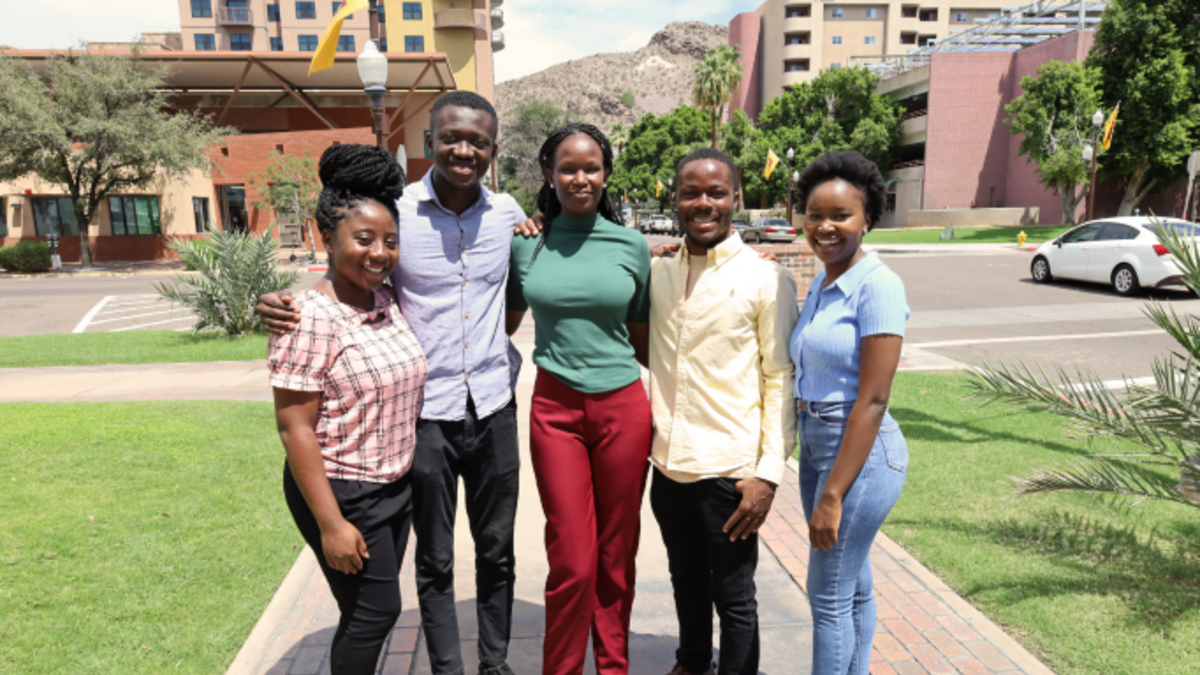ASU, Baobab program revamps educational technology for young African scholars

From left: 2021 Baobab Scholars Jennifer Sarfo, Kwabena Adu-Darkwa, Sandra Nabulega, Hero-Godsway Zilevu and Viola Melly.
Editor’s note: This story is featured in the 2022 year in review.
For prospective graduate students from Sub-Saharan Africa, studying in a world-class university is no longer a wish, but an achievable dream.
The Baobab platform, a Mastercard Foundation initiative in partnership with Arizona State University, offers the Baobab Digital Innovation Scholars Program for young African students to pursue various ASU graduate degree programs related to the educational technology field, including user experience, information technology, learning sciences and software engineering.
The program was conceptualized to build education technology capacity for the African continent and prepare a cadre of young African scholars for employment and entrepreneurial ventures in the field.
Founded in 2021, the Baobab Digital Innovation Scholars Program will provide 25 young African scholars with graduate-level education and professional training in fields critical to the educational technology and online learning space over the next four years.
Baobab currently has five graduate students studying at ASU in its first cohort. The second cohort comprises 10 students who have been offered scholarships for various master’s degree programs. This cohort started classes in August, and will be followed by a third and final cohort of 10 students, who will join the program in 2023.
Jennifer Sarfo, from Ghana, is currently pursuing a master's degree in software engineering through the program and describes herself as a future software developer. Sarfo, whose sister is an alumni of the Mastercard Foundation Scholars Program, said the software engineering training she is acquiring through her program at ASU will enable her to contribute to solving critical global problems that require software solutions.
“I have always believed that mobile and web applications will never go extinct in our world. With people increasingly depending on phones and social media becoming integral parts of people’s lives, mobile and web applications are here to stay,” said Sarfo, who obtained her undergraduate degree from Ashesi University in Ghana before accepting the Baobab scholarship.
“I think Africans are looking for learning opportunities in prestigious world institutions that do not cost as much as they do when attending physically. Online education will help address most if not all of these concerns and give Africans access to higher education that will help them acquire relevant skills.”
Sarfo is currently working on the Salesforce team at EdPlus, building custom mobile and web applications using the Salesforce framework.
Sandra Nabulega, a Makerere University-trained statistician, is one of the students who joined the first cohort of the Baobab program from Uganda. Nabulega was an alum of the Mastercard Foundation Scholars Program before she moved to ASU to pursue a master's degree in learning sciences. Nabulega said a university like ASU, with a variety of learning resources, is a place she always dreamed of studying in.
“Studying about learning and how different people learn is not anything anybody has ever thought of studying in our local universities on the continent. Since I took these courses at ASU, I have realized a great difference as somebody who used to train people. I’m not only learning in a classroom but also taking online learning. I am eager to know more about how different building applications with Salesforce are from other languages like Java, Angular and others, and I can’t wait to develop applications for the team,” she said.
Nabulega described online education as the future of learning in Africa. Given the situation of what happened to in-person classroom learning during the last two years of the COVID-19 pandemic, she described a need to shift to online education that has become a matter of priority.
Kwabena Adu-Darkwa, a Ghanian studying information technology, said he sees a bright future for IT on the continent of Africa given the exponential growth realized in the past decade. He works on the Salesforce team at EdPlus and had also worked in the tech industry in Africa for two years before coming to ASU.
Adu-Darkwa said one of his goals is to leverage skills from the program that will enable him to create innovative educational technology solutions that will fit the context of the African continent.
“With the rising interest in ed tech, I believe that in the next few years we will see many initiatives innovating in this space for the African market. These solutions will become more accessible to the masses and will scale across the continent. I am working on advanced information management systems. My primary goal is to connect what I’m learning, which focuses on big data. This is what I would like to pursue once I return to Africa," he said.
The Baobab Digital Innovation Scholars Program is part of Baobab’s Phase 2, a second five-year grant with the Mastercard Foundation with a focus on training an educational technology talent pipeline of Mastercard Foundation Alumni and Scholars across the continent of Africa.
Written by Atok Dan, Hubert H. Humphrey Fulbright Fellow at the Walter Cronkite School of Journalism and Mass Communication.
More Science and technology

Hack like you 'meme' it
What do pepperoni pizza, cat memes and an online dojo have in common?It turns out, these are all essential elements of a great…

ASU professor breeds new tomato variety, the 'Desert Dew'
In an era defined by climate volatility and resource scarcity, researchers are developing crops that can survive — and thrive —…

Science meets play: ASU researcher makes developmental science hands-on for families
On a Friday morning at the Edna Vihel Arts Center in Tempe, toddlers dip paint brushes into bright colors, decorating paper…

